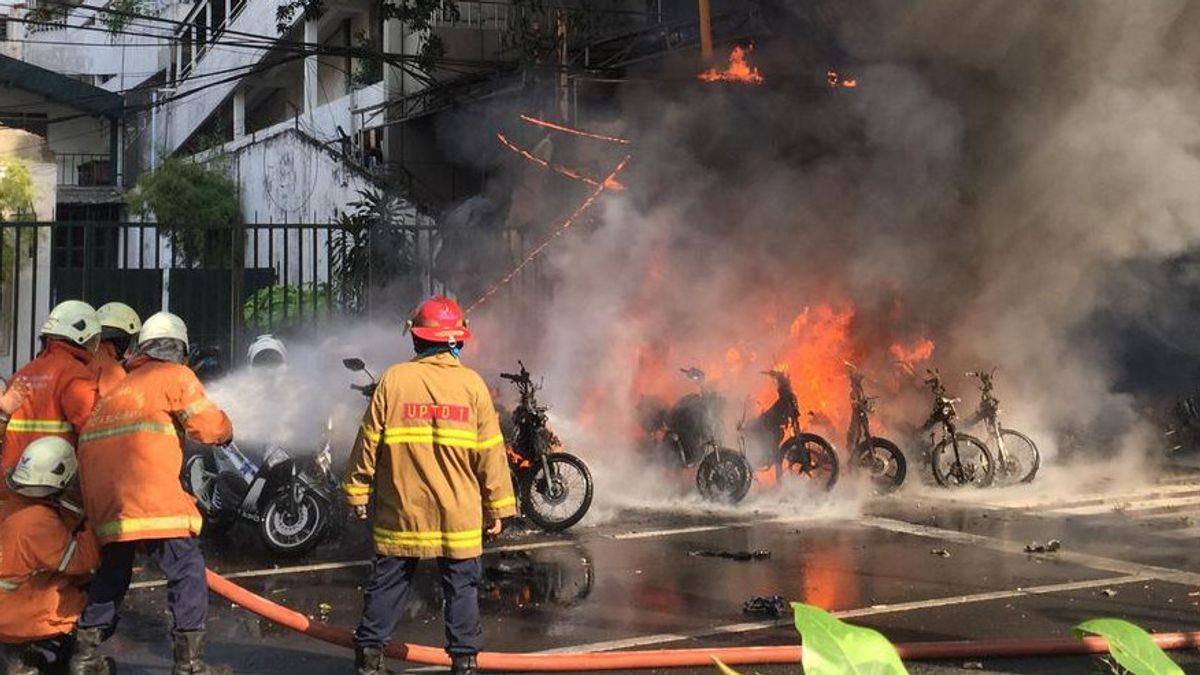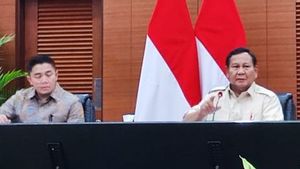Two explosions occurred in the area of Jalan MH Thamrin, Central Jakarta on January 14, 2016. The first explosion at Starbucks coffee shop across from Sarinah Mall. A man who was later identified as Ahmad Muhazan became the suicide bomber at the coffee shop.
Almost at the same time, there was another explosion at a police post near the Sarinah Building. The perpetrator threw a tube bomb while riding his motorbike. After the explosion, the police responded to the shootout action with the perpetrators.
The act of terror known as the Sarinah 'Bom' resulted in 21 deaths. Eight of them died, including four perpetrators. M Ali as the coordinator of the action, Dian Juni, Afif alias Sunakim, and Ahmad Muhazan. They are affiliated with the radical Islamic State of Iraq and Syria (ISIS) which was masterminded by the frontman Jamaah Ansharut Daulah (JAD) Aman Abdurrahman.
Still in the same year, the gang launched another suicide bombing at the Solo Police Headquarters, precisely on July 5, 2016.
Two years later, they moved the terror target to Surabaya. The suicide bombing occurred in a number of churches and Surabaya Police Headquarters in May 2018. This time, the pattern that was carried out changed, radical groups also used women and children to carry out their actions.
The suicide bombers are families (husbands, wives, and children) who are known to be members of the JAD group. The phenomenon of a suicide bombing involving a family, according to the then National Police Chief, General Tito Karnavian, is the first time this has happened in Indonesia.
"The phenomenon of suicide bombing by women, this is the first to succeed. Meanwhile, using children, this is the first time in Indonesia. Why did they take this action? Because the leadership of East Java's JAD (Jamaah Ansharut Daulah) was arrested," Tito told the media crew in May 2018.
After the Sarinah Bombing, Densus 88 Anti-Terror has thwarted dozens of terror plots and arrested more than 100 suspected terrorists throughout 2016-2017, including Aman Abdurrahman. The panel of judges at the South Jakarta District Court on June 22, 2018 has even sentenced Aman to the death penalty.
However, the understanding of radicalism in Indonesia is still growing. JAD's suicide bombing terror continues to occur, such as at the Medan Police Headquarters on November 13, 2019 and at the Astanaanyar Police Headquarters on December 7, 2022.
The acts of terror that occurred in Indonesia certainly cannot be separated from the movement of world radical groups. In the early 1980s to 2000s, the Al Qaeda group presented a new threat in the modern world with terrorism under the guise of religion. The United States, Europe, Africa, and Asia, including Indonesia, have been the targets of bombing terrorists affiliated with the group.
Jamaah Islamiyah (JI) is an Al Qaeda cell in Indonesia. However, as written in the book "Captured Traces of Terror ISIS in Indonesia" by Iksan Mahar, the arrests of a number of JI leaders, such as Abu Bakar Baasyir, Dulmatin, Azahari Husin, and Noordin M Top paralyzed the network. This ended the era of first volume terrorism in the country.
After the establishment of Islamic State groups in Iraq and Syria (ISIS) in 2013, terrorist cells threatened again. Unlike Al Qaeda, which has special criteria for people who want to join so that it seems closed and moving like a secret organization, ISIS appears more open in cooperating with its sympathizers. No need to undergo military education.
"Aman Abdurrahman has never attended military training abroad, but he was able to translate about 30 books and instructions issued by ISIS to be distributed to radical groups in the country," wrote Iksan Mahar.
It was this openness that led to ISIS cells in Indonesia, such as Jamaah Ansharut Daulah (JAD) and Jamaah Anshar Khilafah Daulah Nusantara (JAKDN) which consisted of various ages and professions.
They spread radicalism and improve certain skills by utilizing technological sophistication. No wonder, many acts of terror are currently carried out lone wolf or single perpetrators.
Through that loneliness, they created bombs and the need for acts of terror from their rooms. They created radical movements without leaders and organizations," said Iksan.
In general, according to Daveed Gartenstein-Ross and Nathaniel Barr in an article entitled The Myth of Lone Wolf Terrorism published in the July 2016 Foreign Affairs magazine, there are four categories of single-terrorists.
First, single terrorists have been trained and sent a radical organization, such as ISIS. Second, the sole perpetrators are related through social media to terror action planners. Third, a single terrorist who had contact with a terrorist group, but did not receive specific instructions related to acts of terror.
As for the fourth, someone who is purely the sole perpetrator of terror because he has never communicated with a terrorist group network, either online or directly.
Although only learning through social media, a number of people in the group have been able to create a number of high explosive bombs. It was revealed from the arrest of Endang alias Abu Rafi in the Cibinong area, West Java in May 2019. He has created six bombs that were mixed with the main ingredients of triperoxidated tritriaceton and a number of other chemicals.
The bomb was used in a suicide bombing in three churches in Sri Lanka in early May 2019.
The making of a high explosive bomb has also been revealed by the Densus 88 Anti-terror team when they arrested a terrorist network in Sibolga, North Sumatra led by Abu Hamzah, March 2019. Abu Hamzah has made a homemade bomb with a high explosive system weighing 100 kilograms," Iksan wrote.
The arrest of dozens of JAD sympathizers in 2019 shows a new phenomenon, namely the online terrorist group. They, according to Inspector General Muhammad Iqbal, while serving as Head of the Public Relations Division of the National Police, were active and communicating through the virtual realm.
There are five stages of online radicalism. Starting with intense communication on social media or instant messaging applications. Continuing with an online general meeting to provide radical understanding, then religious leaders or groups initiate land coffee to a number of individuals who are considered to have been exposed to radicalism.
After meeting, they carried out paramilitary training in preparation for acts of terror. The final step is amaliah or acts of terror," Iksan wrote quoting Inspector General Iqbal's statement.
Like the human body, radicalism is a cancer cell in an environment. All parts of society must implement an open and inclusive social system in order to be able to reduce the potential presence of cancer radicalism as early as possible.
This nation actually has a fort against radicalism, namely a communal character that prioritizes mutual cooperation. Do we still keep that character?
"The government's seriousness in countering ideology, the alertness of law enforcement officers, and community participation will determine how much terrorist groups are able to develop in the country," Iksan emphasized.
The English, Chinese, Japanese, Arabic, and French versions are automatically generated by the AI. So there may still be inaccuracies in translating, please always see Indonesian as our main language. (system supported by DigitalSiber.id)













